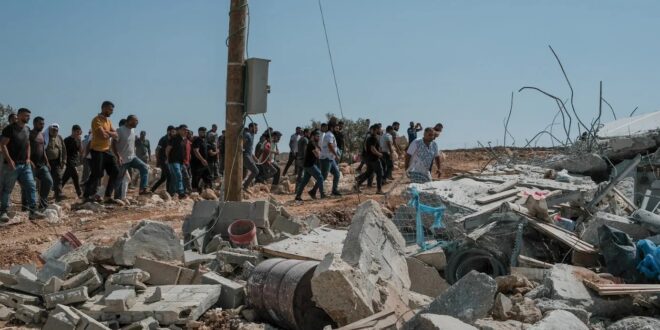Israel’s demolition of Palestinian homes has hit its highest annual level since records began.
On the morning of Sept. 9, two large demolition machines arrived unannounced at the Abu Aram household in the southern West Bank village of al-Khalidiya. While their appearance that morning was unexpected, everybody knew exactly what they had come for: Israeli forces planned to destroy another Palestinian home.
Osama Ghanem Ahmed Abu Aram, 28, had spent the last 18 months building the modest, single-story building. He moved in three weeks earlier, and planned to get married there in the coming days. But by mid-morning that Tuesday, he sat alone, speechless and inconsolable, among the wreckage of his house.
“Do you know he works in Israel in construction?” said Mahmoud, a friend of Osama’s. “All the time he is at work. Sometimes he works on holidays.”
Israeli forces regularly demolish Palestinian homes in the occupied West Bank, including East Jerusalem. Since Israel occupied the territory in 1967, demolitions have been fundamental to the way Israel asserts control over Palestinian lives and Palestinian land.
Yet, in the last two years, the rate of demolitions has spiked amid the growing power of Israeli far-right politicians from the settler community and an increasingly harsh slate of punitive policies Israel has unleashed in the West Bank since Hamas’s deadly Oct. 7, 2023, attacks and the year-long war that has followed.
The war in Gaza has killed at least 43,000 Palestinians, according to Palestinian authorities. Meanwhile, Israeli forces have ramped up a crackdown throughout the occupied West Bank, making life for Palestinians increasingly difficult and dangerous.
Demolitions Soar
In early September, the Israeli military besieged numerous urban areas in Jenin, Tubas, Tulkarem, and Nablus, killing dozens of Palestinians, destroying homes and tearing up infrastructure. In rural areas, vigilante settlers have continued their campaign of intimidation, raiding villages, torching homes, and shooting at Palestinians, all with seeming impunity.
The United Nations says Israel has destroyed more than 1,300 structures so far this year — already the highest annual figure since records began in 2009. Throughout the last 15 years, demolitions have displaced more than 18,800 people in East Jerusalem and the rest of the West Bank.
The structure of Israel’s occupation of Palestine gives house demolition a veneer of legality, in what appears to be a highly bureaucratic process. The Israeli Civil Administration, which reports to the defense ministry, oversees demolitions and is responsible for the day-to-day administration of vast swathes of Palestinian land.
The Civil Administration declares areas of Palestinian land as reserved for certain use, such as agriculture or military training, which prevents Palestinians from being able to obtain planning permission for new structures such as homes, schools or vital infrastructure like water cisterns. Israeli authorities often even declare repairs to old structures illegal.
Settlement Expansion
If a structure does not have planning permission, the Civil Administration can present it to Israeli courts that then issue a “Standing Order” for demolition. These orders can be appealed, but in reality, Israeli courts rarely, if ever, rule in favor of Palestinian legal challenges to demolition notices. Once the court issues the Standing Order, this might sit over a family for months or even years until demolition actually occurs.
In the past, Israeli authorities would give a few weeks warning before the demolition occurs, but in recent years the first notice Palestinians have that demolition is imminent is when the military bulldozers arrive outside their homes.
In reality, house demolition appears highly arbitrary in its choice of Palestinian property to destroy, and when it decides to do so. As such, the UN, the International Committee for the Red Cross, and human rights groups consider demolitions a form of collective punishment, and thus potentially a war crime.
The demolition of Palestinian homes also stands in stark contrast with Israel’s active settlement building program which occurs on exactly the same land.
Settlement policy is now largely in the hands of Israel’s Finance Minister, Bezalel Smotrich, a settler himself and far-right member of the Knesset.
Earlier this summer, Smotrich stepped up the Israeli government’s settlement expansion, granting permission for 5,000 new housing units, seizing an additional five square miles of Palestinian land in the Jordan Valley, and retroactively approving construction of numerous settler “outposts.” Outposts, settlements Israelis establish without authorities’ permission, are illegal under both Israeli and international law.
“Thwarting a Palestinian State”
Announcing the settlement expansion, Smotrich took to X to declare: “We are building the good land and thwarting the establishment of a Palestinian state.”
The UN has described Israel’s settlement policy and the population transfers it leads to as a war crime. Even the US and the European Union — unwilling to meaningfully condemn the war on Gaza — have described the settlements as a violation of international law.
Back in Khalidiya that Tuesday morning, dozens of local residents left their work and rushed to the house as word went round that a demolition was imminent. “We can’t work,” Mahmoud said. “Our minds become busy. We worry about Osama.”
Still, they could do little more than bear witness in the face of the Israeli military. As for the Israeli soldiers, they mostly looked bored, some playing with their phones as the demolition vehicles tore through the concrete roof. It was all over in a matter of minutes.
 Eurasia Press & News
Eurasia Press & News




